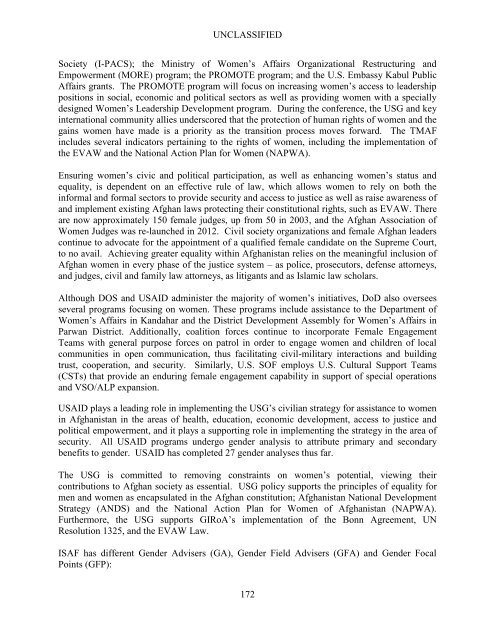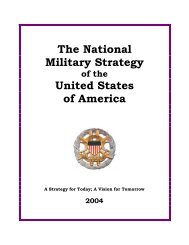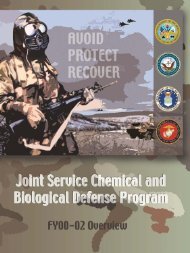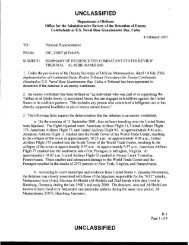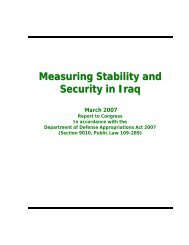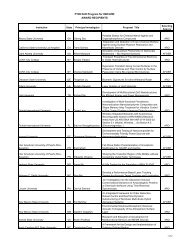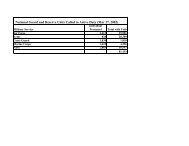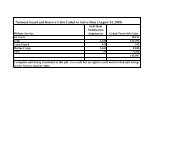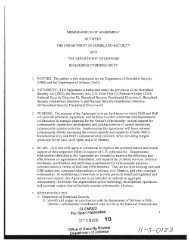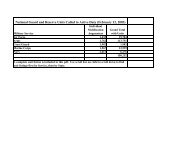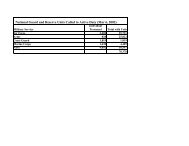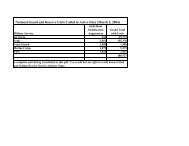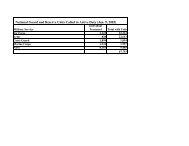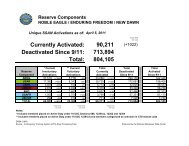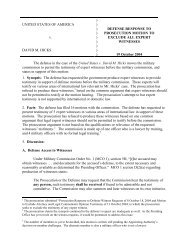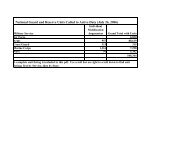Report - United States Department of Defense
Report - United States Department of Defense
Report - United States Department of Defense
You also want an ePaper? Increase the reach of your titles
YUMPU automatically turns print PDFs into web optimized ePapers that Google loves.
UNCLASSIFIED<br />
Society (I-PACS); the Ministry <strong>of</strong> Women’s Affairs Organizational Restructuring and<br />
Empowerment (MORE) program; the PROMOTE program; and the U.S. Embassy Kabul Public<br />
Affairs grants. The PROMOTE program will focus on increasing women’s access to leadership<br />
positions in social, economic and political sectors as well as providing women with a specially<br />
designed Women’s Leadership Development program. During the conference, the USG and key<br />
international community allies underscored that the protection <strong>of</strong> human rights <strong>of</strong> women and the<br />
gains women have made is a priority as the transition process moves forward. The TMAF<br />
includes several indicators pertaining to the rights <strong>of</strong> women, including the implementation <strong>of</strong><br />
the EVAW and the National Action Plan for Women (NAPWA).<br />
Ensuring women’s civic and political participation, as well as enhancing women’s status and<br />
equality, is dependent on an effective rule <strong>of</strong> law, which allows women to rely on both the<br />
informal and formal sectors to provide security and access to justice as well as raise awareness <strong>of</strong><br />
and implement existing Afghan laws protecting their constitutional rights, such as EVAW. There<br />
are now approximately 150 female judges, up from 50 in 2003, and the Afghan Association <strong>of</strong><br />
Women Judges was re-launched in 2012. Civil society organizations and female Afghan leaders<br />
continue to advocate for the appointment <strong>of</strong> a qualified female candidate on the Supreme Court,<br />
to no avail. Achieving greater equality within Afghanistan relies on the meaningful inclusion <strong>of</strong><br />
Afghan women in every phase <strong>of</strong> the justice system – as police, prosecutors, defense attorneys,<br />
and judges, civil and family law attorneys, as litigants and as Islamic law scholars.<br />
Although DOS and USAID administer the majority <strong>of</strong> women’s initiatives, DoD also oversees<br />
several programs focusing on women. These programs include assistance to the <strong>Department</strong> <strong>of</strong><br />
Women’s Affairs in Kandahar and the District Development Assembly for Women’s Affairs in<br />
Parwan District. Additionally, coalition forces continue to incorporate Female Engagement<br />
Teams with general purpose forces on patrol in order to engage women and children <strong>of</strong> local<br />
communities in open communication, thus facilitating civil-military interactions and building<br />
trust, cooperation, and security. Similarly, U.S. SOF employs U.S. Cultural Support Teams<br />
(CSTs) that provide an enduring female engagement capability in support <strong>of</strong> special operations<br />
and VSO/ALP expansion.<br />
USAID plays a leading role in implementing the USG’s civilian strategy for assistance to women<br />
in Afghanistan in the areas <strong>of</strong> health, education, economic development, access to justice and<br />
political empowerment, and it plays a supporting role in implementing the strategy in the area <strong>of</strong><br />
security. All USAID programs undergo gender analysis to attribute primary and secondary<br />
benefits to gender. USAID has completed 27 gender analyses thus far.<br />
The USG is committed to removing constraints on women’s potential, viewing their<br />
contributions to Afghan society as essential. USG policy supports the principles <strong>of</strong> equality for<br />
men and women as encapsulated in the Afghan constitution; Afghanistan National Development<br />
Strategy (ANDS) and the National Action Plan for Women <strong>of</strong> Afghanistan (NAPWA).<br />
Furthermore, the USG supports GIRoA’s implementation <strong>of</strong> the Bonn Agreement, UN<br />
Resolution 1325, and the EVAW Law.<br />
ISAF has different Gender Advisers (GA), Gender Field Advisers (GFA) and Gender Focal<br />
Points (GFP):<br />
172


